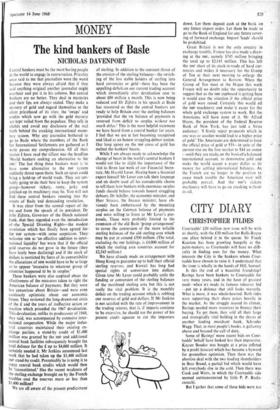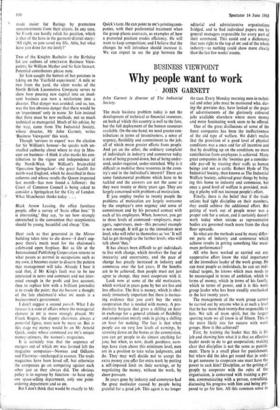CITY DIARY
CHRISTOPHER FILDES
Courtaulds' £20 million new issue will be with us shortly, with the £30 million for Rolls-Royce- one place -behind it in the queue. Sir Frank Kearton has been growling hungrily at the paint-makers, so Courtaulds will have no diffi- culty in finding uses for the . money. What interests the City is the bankers, whom Cour- taulds have chosen to raise it. I understand that the issue is wholly in the hands of Hill, Samuel.
Is this the end of a beautiful friendship? Barings have been bankers to Courtaulds for very many years, and in the hour of greatest need—when to made its famous takeover bid --put up a defence that still looks masterly. What is more, it was whole-hearted. Both sides were supporting their share prices heavily in the market. As the struggle neared its climax, Barings needed more resources to finance their buying. To get them, they sold all their large and strategically vital bolding in the shares of another leading merchant bank, Schroder Wagg. That, in most people's books, is gallantry above and beyond the call of duty.
Some of Barings' more recent bids on Cour- taulds' behalf have looked less than impressive. Kayser Bondor was bought at a price inflated by a profit forecast which has become a byword for groundless optimism. Then there was the abortive deal with the two leading shareholders in Bear Brand, a partial bid which would have left everybody else in the cold. Then there was Cook and Watts, in which the Courtaulds side seemed outmanoeuvred by little P. P. Rodo- canachi.
But I gather that some of these bids were not made easier for Barings by premature announcements from their clients. In any case, Sir Frank can hardly relish his position, which is that of the hero in the garment-district story: `All right, so you saved my life, Abie, but what have you done for me lately?'
Two of the Knights Bachelor in the Birthday list are authors of SPECTATOR Business View- points; Sir William Mather and Sir lain Stewart. Potential contributors please note.
Sir lain caught the hottest of hot potatoes in taking on the 'Fairfield experiment.' A mile or two from the yard, the silent works of the North British Locomotive Company serves to show how pouring new capital into an insol- vent business can turn a misfortune into a disaster. That danger was avoided; and so, too, was the less obvious danger that there would be an 'experiment' only in name. Sir Iain insisted that there must be new methods, not so much technical as managerial. Much of his advice, by the way, came from The Industrial Society, whose director, Mr John Garnett, writes 'Business Viewpoint' this week.
Though 'services to export' was the citation for Sir William's honour—he speaks with un- rivalled authority about where to stay in Mos- cow on business—I think it also marks his con- tribution to the vigour and independence of the North-West. Sir William's brain-child 'Operation Springclean'—the great facelift for north-west England, which he described in these columns and whose results the Queen inspected last month—has now found a follower: the Court of Common Council is being asked to consider a Springclean for the City of London. What Manchester thinks today . . .
Black Arrow Leasing, the office furniture people, offer a survey of 'basic office lore.' It is interesting,' they say, `to see how strongly entrenched is the convention that receptionists should be young, beautiful and cheap.' Um.
Heat such as that generated in the Mirror building takes time to die down—I don't sup- pose there's much need for the chairman's celebrated open fireplace. But as life at the International Publishing Corporation returns to what passes as normal in occupations such as my own, it becomes easier to discern the pattern that management will take. Already I hear it said that, if Mr King's fault was to be too interested in news and comment and not inter- ested enough in the profit and loss account, then to replace him with a brilliant journalist is to evade the point; that (to borrow a thought of the late chairman's) what mc needs is a businessmen's government.
I don't suggest a second putsch. What I do foresee is a state of affairs where the managerial element in 1PC is more strongly placed. Mr Frank Rogers, the deputy chairman, always a' powerful figure, must now be more so. But at this stage my money would be on Mr Arnold Quick, under whose command are IPC'S unique money-spinners, the women's magazines.
It is certainly true that the sequence of mergers out of which n'c was formed left the magazine companies—Newnes and Odhams and Fleetway—unchanged in essence. The trade magazines have been hived off, but otherwise the companies go on competing against each other just as they always did. The obvious policy is to regroup by function—to have only one space-selling department, only one print- ordering department and so on.
But I don't think that would be exactly to Mr
Quick's taste. He can point to IPC'S printing com- panies, with their preferential treatment when the group places contracts, as examples of how a protected position erodes efficiency. He will want to keep competition; and I believe that the changes he will introduce should increase it. We can expect to see the gap between the editorial and administrative organisations bridged, and to find individual papers run by general managers responsible for every part of their command. This could end a dichotomy that runs right to the top of IPC and of the whole industry—as nothing could show more clearly than the last few weeks' events.











































 Previous page
Previous page